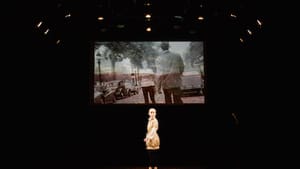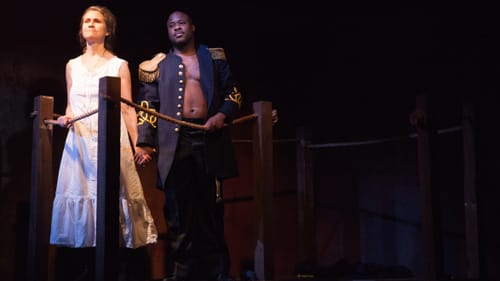Stay in the Loop
BSR publishes on a weekly schedule, with an email newsletter every Wednesday and Thursday morning. There’s no paywall, and subscribing is always free.
Acting the part
Finding solidarity onstage and on the page

On New Year’s Eve, I asked friends to come bearing appetizers, wine, and truth. “In these surreal and scary times,” the invitation said, “we’d like each of you to bring some words—poem, song, story, video—that inspire you with their message of resistance, compassion, tenacity, or hope, words to hold in our pockets as we carry on into 2017.”
We laid out a pile of index cards, loose-leaf rings, and our best pens. For an hour or so, while nibbling spiced chickpeas and Vietnamese salad rolls, we read aloud, swapped books, and scribbled down quotes we wanted to keep. Someone shared a May Sarton poem. Another read from Mary Oliver. I turned to Harper’s final monologue in Tony Kushner’s epic Angels in America: “Nothing’s lost forever. In this world, there is a kind of painful progress.”
In 1962, the year I was born, New Jersey poet and physician William Carlos Williams wrote,
It is difficult
to get the news from poems
yet men die miserably every day
for lack
of what is found there.
Lately, I’ve found myself turning “there”: to poems, stories, and plays, seeking antidotes to credulity-straining headlines. I want reminders that people have endured worse horrors (and that some lived to tell about them), and I want company during the long slog of resistance.
Fogging the truth
I know every president fogs the truth. George W. Bush insisted that Saddam Hussein wouldn’t allow United Nations inspectors into Iraq. Richard Nixon told the nation he was not a crook. Bill Clinton famously avowed, “I did not have sexual relations with that woman.” But in the age of Trumpery (“worthless nonsense,” according to Merriam-Webster), we’ve tumbled down the rabbit hole into a land of unprecedented lies. “All is going well with very few problems,” Trump chirped as thousands of protesters converged on the nation’s airports last weekend and Democrats prepared a challenge to his executive order barring refugees and immigrants.
In the face of all that, sitting at home with my index cards felt a bit lonely. So I went to the theater, where extravagant lies are spun in the service of truth and angels can crash through bedroom ceilings.
I caught the final rehearsal of Mary Tuomanen’s MARCUS/EMMA, which imagines a sex-charged, politics-laden encounter between Jamaican entrepreneur/activist Marcus Garvey and Jewish anarchist Emma Goldman. The play reminded me that revolutionary fervor can blinker the best of us, and that love can’t conquer differences but can, perhaps, help us see each other as allies in a common cause. Then I snagged a last-moment ticket to Hello! Sadness!, Tuomanen’s solo blitz through seven centuries that conjures Joan of Arc, actress Jean Seberg, Black Panther Party leader Fred Hampton, the Black Lives Matter movement, and sexual violence, all in the name of thinking about the price artists and activists pay (madness, censorship, surveillance, death) and the risks they continue to take, even so.

I sought those plays partly for the communal experience: to sit in a darkened room, elbowed by strangers, for a wild ride through someone else’s viewpoint. I’ve felt starved for what theater can do: disrupt complacency, blurt the unspeakable, prod us to think and re-think and talk and keep talking. I don't mean theater as the “safe and special place” about which Trump facetiously tweeted after the cast of Hamilton spoke (with admirable restraint and respect) to Vice President-Elect Pence. No, give me tickets for anti-Trumpery: Possibility, empathy, the raw, the real.
Alternative facts
Apparently, I’m not alone. Hello! Sadness! and Marx in Soho, another solo play (written by historian Howard Zinn and performed by Robert Weick) whose title character returns from the dead to decry capitalism on behalf of the 99 percent, played their brief runs to sold-out houses.
No wonder theatergoers are seeking a potent tonic. We have a president who is unashamed to flaunt props, like the piles of unlabeled manila folders he displayed as “evidence” of the paperwork required to divest himself of his businesses -- a president who believes it’s enough to act the part, to put on the suit and crimson tie, strut around the White House, and sign stacks of executive orders, democracy be damned. Alternate realities on the proscenium stage are the stuff of art. Alternate realities on the national stage are the rumblings of fascism.
Don’t buy it. Instead, buy a copy of George Orwell’s 1984, which became the best-selling title on Amazon last month. Read it. Connect the dots. Find a poem that stabs you, then learn it by heart, in case they burn the books. Get thee to the theater. And when the president and his cronies try to starve the NEA (and you know they will, despite the fact that the arts allocation amounts to .004 percent of the federal budget), sign the petitions, badger Congress, and pledge allegiance to imagination, which no law can squelch.
This week, while my laptop powered up to news of supremacist-in-chief Steve Bannon’s elevation to the National Security Council, I flipped through my sheaf of index cards. A line from poet Naomi Shihab Nye caught my glance: “It’s late,” she wrote, “but everything comes next.”
Indeed. I propped that card behind my planner, where I could look at it all day. Then I picked up the phone and called my senators.
Sign up for our newsletter
All of the week's new articles, all in one place. Sign up for the free weekly BSR newsletters, and don't miss a conversation.

 Anndee Hochman
Anndee Hochman